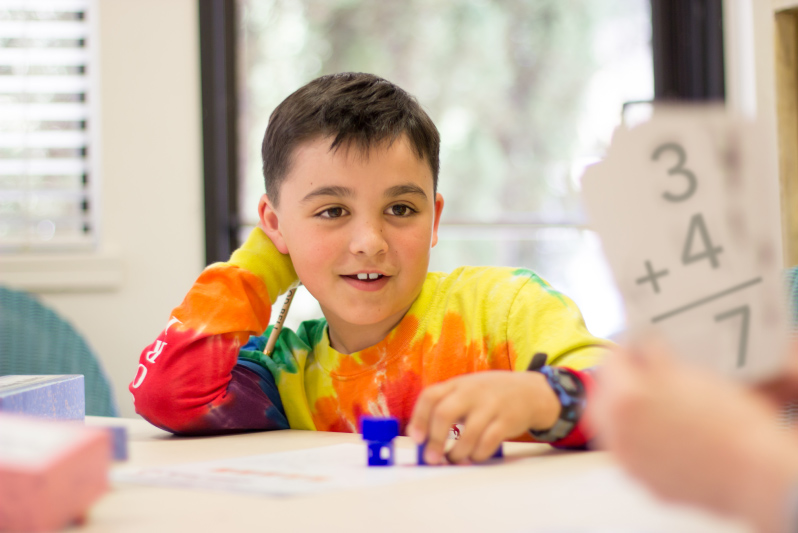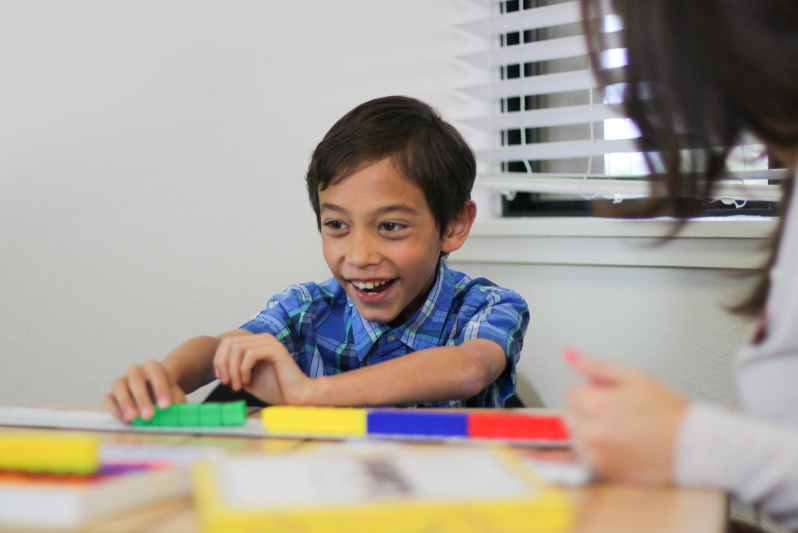
Dyscalculia, often termed ‘mathematical dyslexia,’ is a specific learning disability that impacts an individual’s ability to comprehend and work with numbers. Just as dyslexia affects reading, dyscalculia affects math skills. Those with this math learning disability may struggle with basic number concepts, face challenges recalling math facts, and have difficulty performing calculations or solving mathematical problems.
At Lindamood-Bell, we understand the unique challenges posed by dyscalculia. We offer comprehensive support through personalized intervention programs designed to enhance numeracy skills. We aim to help individuals with dyscalculia excel academically and gain confidence in their mathematical abilities.
Understanding Dyscalculia

Understanding the meaning of dyscalculia is crucial for providing effective support. Dyscalculia, sometimes called ‘mathematical dyslexia’ or ‘number dyslexia,’ hinders an individual’s ability to understand and work with numbers. This math learning disability affects basic arithmetic, number sense, and mathematical reasoning.
Research indicates that dyscalculia affects approximately 5-7% of the population, making it as prevalent as dyslexia. Despite its prevalence, it often goes undiagnosed and misunderstood, impacting millions of children and adults worldwide.
Lindamood-Bell is dedicated to providing effective interventions and support for individuals with dyscalculia. Our evidence-based programs, such as On Cloud Nine® Math, are designed to improve math skills and overcome the barriers associated with this learning disability.
Signs and Symptoms of Dyscalculia

Many students feel frustrated with math and may avoid it, but if you suspect a student has dyscalculia, there are specific signs and symptoms to watch for:
1. Difficulty remembering math facts
Individuals with dyscalculia may struggle to recall basic math facts, such as addition, subtraction, multiplication, or division tables, even after repeated practice. This can slow down problem-solving and lead to frustration during more complex math tasks.
2. Struggling with computation
Individuals with dyscalculia may find it hard to perform simple calculations like addition, subtraction, multiplication, and division, which can hinder their ability to solve math problems and complete mathematical tasks.
3. Becoming overwhelmed by word problems
Word problems can cause confusion, as individuals with dyscalculia may struggle to extract relevant information and apply the correct operations. The combination of reading comprehension and math processing can feel overwhelming, leading to anxiety and avoidance.
4. Difficulty understanding new math concepts
Individuals with dyscalculia may find abstract concepts such as fractions, decimals, and percentages difficult to grasp, impacting their comprehension of complex mathematical ideas and practical applications.
If you recognize these signs and symptoms in someone, seeking support and intervention is crucial. Lindamood-Bell offers specialized programs to help individuals with dyscalculia develop essential math skills and overcome challenges. Our evidence-based instruction focuses on building foundational skills and improving comprehension, enabling success in mathematics and other academic areas for all students, including those with dyscalculia.
The Cause of Dyscalculia

A primary cause of math difficulties and dyscalculia is an inability to create a gestalt image for the concepts underlying math processes. Individuals often attempt to memorize facts instead of being able to think, reason, and problem-solve with numbers.
Individuals of all ages may experience an inability to image the concepts underlying math processes. This may cause weakness in
- Learning math fact families
- Grasping mathematical relationships
- Following proper mathematical operations
- Solving word problems
- Estimating numerical values
- Understanding higher-level math
Lindamood-Bell math instruction features On Cloud Nine® Math Program Visualizing and Verbalizing® for Math. The On Cloud Nine Math Program stimulates the ability to image and verbalize the concepts underlying math processes. Concept and numerical imagery are integrated with language and applied to math computation and problem-solving. There is an emphasis on both mathematical reasoning and mathematical computation. Program authors, Nanci Bell and Kimberly Tuley describe, “Mathematics is cognitive processing, thinking, that requires the dual coding of imagery and language. Imagery is fundamental to the process of thinking with numbers.” We believe that individuals of all ages can learn to do and enjoy math.
Hope for Students with Dyscalculia
At Lindamood-Bell, students receive individualized instruction using one or more of our evidence-based programs. The On Cloud Nine (OCN) Math Program develops the ability to image and verbalize math concepts and processes. Concept imagery and numeral imagery are integrated with language to improve mathematical reasoning and computation. On Cloud Nine math instruction can address the needs of students previously diagnosed with dyscalculia.
The following shows the math performance, pre- and post-instruction, of all students who received On Cloud Nine math instruction at Lindamood-Bell between 2008 and 2023. These students experienced large (statistically significant) improvements in all math subtests after receiving On Cloud Nine math instruction.
Results of Students Who Received Primary Instruction in Mathematics

Years: Jan. 2008 – Dec. 2023
Number of Students: 267
Average Age: 10.7
Average Hours of Instruction: 78.3
Lindamood-Bell Instruction Implemented: On Cloud Nine Math
On average, students who received all or most of their instruction in On Cloud Nine Math achieved significant improvements in math. They made large (statistically significant) standard score changes on all mathematics subtests. The 28-point percentile increase in the Test of Mathematical Abilities (TOMA) Computation subtest puts these students within the normal range (25th–75th percentile). (Of the 267 students, the TOMA Computation subtest was computed out of 188 students and the TOMA Story Problems subtest was computed out of 194 students as a result of missing pre- or retest data.)
Help for Dyscalculia at Lindamood-Bell

Lindamood-Bell provides individualized, evidence-based instruction to assist students facing challenges in reading, comprehension, and math, including those diagnosed with dyscalculia. Whether your student is newly diagnosed with dyscalculia or has struggled for years, we believe that dyscalculia doesn’t have to be a lifelong obstacle.
Our instruction begins with a comprehensive Learning Ability Evaluation. This assessment identifies underlying learning challenges and helps us understand your student’s unique needs. Based on the evaluation results, we develop a personalized instruction plan tailored to address the root causes of their math difficulties. Take the first step toward transforming your student’s future by scheduling a Learning Ability Evaluation today.
Student Story: Improving Mathematics with On Cloud Nine
For one nine-year-old, believing he was “bad at math” led to a significant drop in self-esteem. A Learning Ability Evaluation revealed that an underlying comprehension weakness was contributing to his struggles with math. After completing our instruction, his confidence soared. His mother noted, “The stark contrast between what he’s doing now and before is remarkable. He actually goes in feeling good about it and is truly succeeding.”
Watch this family’s inspiring story:
For over 35 years, Lindamood-Bell’s sensory-cognitive approach has provided hope and achieved lasting results, helping students overcome their learning challenges. We have developed proven methods that support individuals with dyscalculia, focusing on the sensory-cognitive foundation of math skills. Our evidence-based instruction delivers personalized learning experiences tailored to each student’s needs.
Through our programs, significant progress in math is attainable for all students, including those diagnosed with dyscalculia. Our goal is to empower individuals to become independent learners who can confidently navigate the world of numbers and math. We can help your child reach their full potential—discover more about our programs today. Get in touch or call 800-233-1819.






